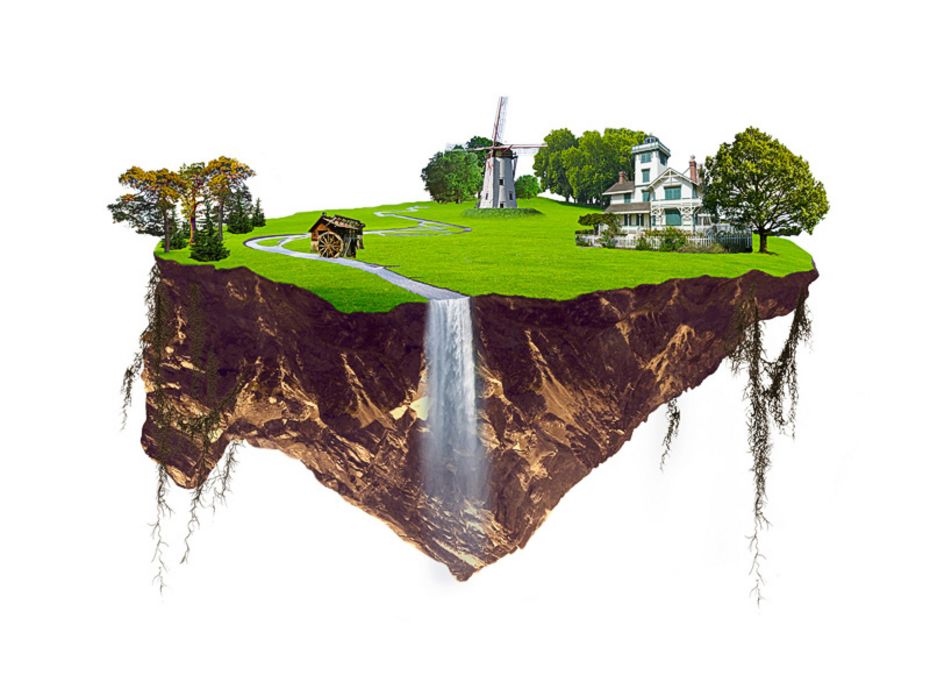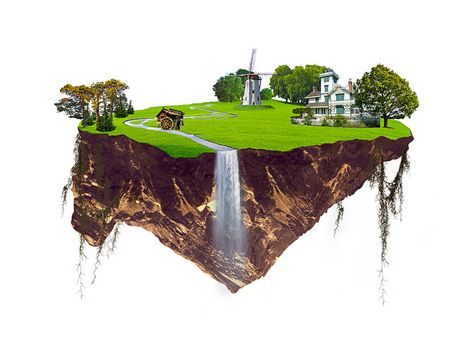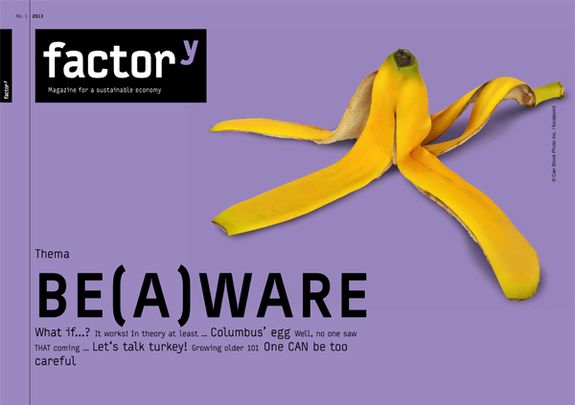Be(a)ware

In a few years time, one in two new cars in Germany will be a heavy off-road vehicle such as a SUV, although 80 percent of the population live in cities. Obviously, sustainable development is only possible if people are willing to change. However, sustainable development does not call for another New Man but for people who tend to look at traditions, both those which are tried and tested as well as at those that have been refuted, with an inquisitive eye.
By Bernd Draser
Translated from the German by Christine Kühn, Alina Junk and Theresa Lupek
Everything would be fine if humans were better creatures. The world would be a just and happy place, ready for a long future! But what is one to do if people are simply not willing to better themselves? If they choose to sin? If they would rather buy a second car instead of a bicycle and choose long-distance travel over urban transport? Can you lead a horse to water and also make it drink? If not for the sake of people, then at least for the sake of future generations? Should people be educated in order to reach the ideal of a new and improved man? And if they refuse to be educated, would breeding be an option? Do we not need a different world, a utopia? Are we, who only want the best for this world, not obligated to strive for this one goal, using all means available? Especially now, in the face of crisis?
In his 1999 essay Rules for the Human Zoo, Peter Sloterdijk proposed effective procedures of self-taming by means ranging from anthropotechnology to the design of specific characteristics e.g. through optional birth or prenatal screening. This could also be the means towards ending violence in American schools, given that school education cannot achieve anything when faced with the negative effects of the media. On stage, Sloterdijk turned his witty puns about reading and selection (borrowed from Platon, Nietzsche and Heidegger) into the serious subject of biopower.
Let us continue to play this game with language and extend biopower to biomass, organic matter, to render people themselves ‘organic’ in order to best achieve sustainable development. If diet and transport are the two major fields for the consumption of resources, would it not be neat to genetically optimise future generations in a way that makes them give up meat and long-distance travel voluntarily (or rather biologically) and prefer a cooperative lifestyle over a competitive one?
Utopia is an island
Ideas and practices of breeding have been popular since the 19th century. The New Man’, which was also the title of an exposition at the German Hygiene Museum in Dresden (1999), is said to be an obsession of the 20th century, of everyone who wants a different world, whether with regard to architecture, economy, race, politics, or transport. Utopian dreams of a new man were always followed by a rude awakening. This is inherent to utopias, just as the totalitarian claim on the establishment of a new golden age while destroying everything in opposition to it. The reason for evolving utopian concepts lies in the shortcomings of the current society which become hard to bear. To produce a straightforward narration, the present is simplified e.g. by reducing complexity, simplifying answers and overdrawing scenarios. This can be attained by a clear division between good and bad, friend and foe. The narration either depicts a concept of a seemingly better, fairer society or envisions the consequences of carrying on as before in a kind of apocalyptic scenario.
Naturally, the dramaturgically smartest solution unites both possibilities in a narration about the soon-to-occur apocalypse followed by a new world that is populated by a new type of people – but to arrive at this point, apocalypse has to be brought upon the world first!
The total break with past and present is an essential device. This is the only way to enforce what is deemed to be ‘good’, using violence if necessary, as nonconformism needs to be rooted out. And since we always wait for the future for too long just to see it crumble into yet another present, we lose patience and want to see results in the form of small slices of utopia which can be easily digested. These slices are often an alternative and their realisation requires a lot of work as the complexity, which utopia had been meticulously stripped off, now resurfaces. The only means of counteracting this, is to strictly separate utopia from the decadent rest of the world. Therefore, utopias in literature are generally set on islands (Utopia in Morus’ work, Atlantis in Plato’s work). In his painting ‘Das goldene Zeitalter’ (‘The Golden Age’) Lukas Cranach surrounds his utopia with a veritable wall. Political utopias of the 20th century follow this tradition and emphasize it with barbed wire.
Backwards instead of forwards
Where does this leave us? Do we need to give up in the face of future? Do we have any power over what is yet to come? Indeed, we do. If sustainability were an actual utopian idea, we would be in serious trouble. However, sustainability is not a futuristic but a traditional project. What does this mean? The future is neither predetermined nor unknown to us. It is the result of overly complex interactions which we cannot influence. If we look forward, we see nothing. Our projects for the future are actually projections. Even worse: the great phantasms of feasibility, utopian societies, are at the root of all the problems we seek to solve with their help. The adventure of subjugating nature through technology was also the beginning of our modern philosophies featuring Bacon and Descartes, and also Rousseau who was strangely critical of civilisation.
It is popular within the environmentalist movement to declare that we are digging our own graves. This metaphor holds more meaning than one would first attribute to it. As the grave we are digging is not nature, nature is the ground surrounding our grave. We are digging because of our traditions, since they influence our behavioural patterns and our relationship to the world. A glance backward is more productive and important than a glance forward because we can learn more from our past than from apocalyptic expectations. Foremost, we can learn that sustainability cannot and does not need to be forced by biopower and genetic engineering. However, sustainability itself plays a major role in our traditions.
Traditional social techniques are innovative
Strategies we want to employ today in order to ensure sustainability are thoroughly old-fashioned and linger under the surface of our industrialised lifestyle. Cyclical thinking is a tribal heirloom. The whole concept of realising one’s future is still fresh and superficial, so it only occupies a very short span of time in our predominantly tribal history. Some obvious examples: The boom of today’s urban gardening is the echo of old subsistence farming, which has been an everyday reality from the Neolithic Revolution to the post war era, usually expressed by small domestic vegetable patches. Non-regional and -seasonal consumption is quite a new concept anyway. Bartering and sharing is as old as village life and family economy. D.I.Y. and make do and mend had been the norm for a long time. The renunciation of meat finds its thousand-year-old prelude in religious fasting. Even if one only casts back a quick glance, this proves to be more pragmatic than the prophecy of a new man. Navigation by looking in the rear view mirror is not misleading.
Tradition is an ever-growing resource
If we discarded the conceited goals of utopias, especially with regard to our lifestyle, and decided to tackle things within our immediate reach a bit more efficiently and, thus, more traditionally, we could profit a lot from it. The discussion about sustainability will need to stop focusing on trying to achieve major, global goals and start to become more regional diverse. Then we will be able to deduce that it is neither about individual and technological solutions nor about major changes in economy and politics, which at long last will burn more natural resources, but that it is all about small and gradual changes in the taste and values of individuals.
Furthermore: Is it not wonderful that tradition, as a resource, does not decline as it is used but grows and evolves?
Traditions in art can teach us that aesthetics can be a part of sustainability. Hopefully, this will diminish the influence of ethics, because as soon as a sustainable lifestyle becomes a moral imperative, people will consider it reluctant and it will be destined to fail. Aesthetics can fulfil the same functions as ethics, only better. A simple example for this phenomenon: Does a piece of art become more or less beautiful when something is added to it? A visit to a museum or a classical concert will do more to foster an economy of modesty and sufficiency than an appeal to ethics or advertising a new more environmentally friendly product as a new must-have. An aesthetical way of life is the best antidote to the hideousness of mass consumption. Nietzsche once said in a different context that now is the time to let our taste guide us, not our reason.
We can talk about exemplary and experimental lifestyles, and we do not need to leave it at that, but we can also work on our lifestyles: taking specific, small steps, without great drafts which only gain importance from the denial of the matter’s complexity. These attempts at first steps would be tackled with relish, without a tendency towards totality, without the will to a last end, without the elimination of humans, just a never-ending happy movement, a lively game…
Bernd Draser is a philosopher and lecturer at the ecosign-Akademie in Cologne. He wrote for factory about the art of separating and possessing to participate.
Beiträge online
BE(A)WARE

- What If...?
- It Works! In Theory at Least ...
- Columbus’ Egg
- Growing Older 101
- Vorsicht vor zuviel Vorsicht
Themen
- The Domino Effect: the Mobility Transition as an Engine for the ‘Great Transformation’
- Cities Use the Space
- Decarbonization by 2030
- The fear of biting the hand that feeds you
- Where investing is a pleasure
- Why divestment is going to change the world
- A Robin Hood tax for climate protection
- May the Force Be with Us
- Modern Strategies
- The prerogative of interpreting the future now lies with the companies involved in climate protection”
- From Negotiating to Trading Equitably
- Can a donkey be tragic?
- Rethink rather than rebound: a sufficiency revolution must precede the efficiency revolution
- On Rebound, Prebound and Performance Gaps
- So Let Us Seize Power Then!
- With Common Property Against Political Failure
- So Let Us Seize Power Then!
- The Comforting Beauty of Failure
- “It Is Not Impossible at All.“
- Resource-light shopping
- Men Have Not Stopped Giving the Advantage to Women – So Far
- Toothpaste for Princesses and Soup for Pirates
- It is about equality
- A nice day
- Initiative instead of frustration
- The right ingredients
- Resilient for Life
- Not only, but also
- Appreciation – more please!
- Worth more than money
- Learning to value the value of goods
- Worth and Values
- The Transformative Power of Science
- Historically effective: How innovation and technology transform
- The Disappearance of Products
- Growing Older 101
- Columbus’ Egg
- It Works! In Theory at Least ...
- What If...?
- Analysing Separately – Thinking and Acting Together!
- Let’s Break Away from Determined Breaking Points
- More Gold in Waste than in Mines
- The art of separation
- Should you really DIY?
- The Aesthetics of Do-It-Yourself
- Standing on One’s Own Feet
- From the handaxe to desktop fabrication
- Using Shares to Survive the Crisis
- When Citizens participate
- Possess to Participate
- The Right Growth at the Right Time
- Gunter Pauli and Blue Economy
- When Sustainability Grows
- How we treat Growth
- Illusions about Growth


